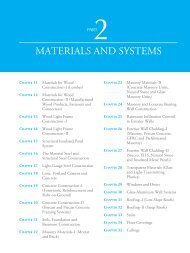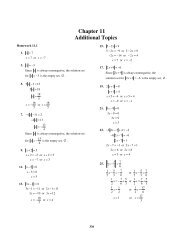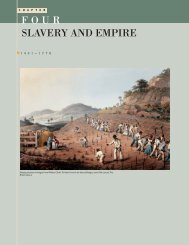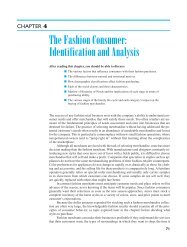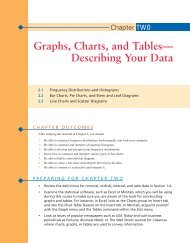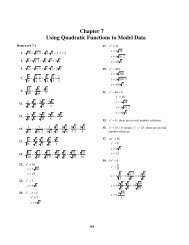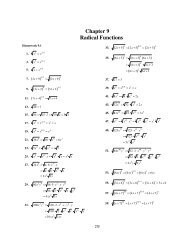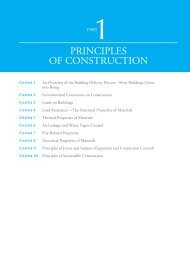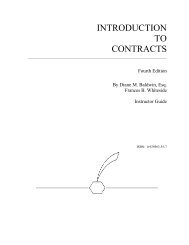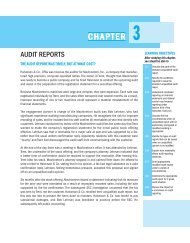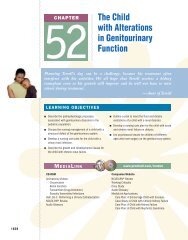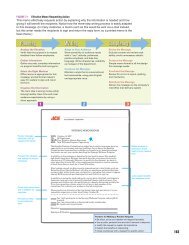audit reports
audit reports
audit reports
Create successful ePaper yourself
Turn your PDF publications into a flip-book with our unique Google optimized e-Paper software.
The <strong>audit</strong>or’s concern in such situations is the possibility that the client may not be<br />
able to continue its operations or meet its obligations for a reasonable period. For this<br />
purpose, a reasonable period is considered not to exceed 1 year from the date of the<br />
finan cial statements being <strong>audit</strong>ed.<br />
When the <strong>audit</strong>or concludes that there is substantial doubt about the entity’s ability<br />
to continue as a going concern, an unqualified opinion with an explanatory para -<br />
graph is required, regardless of the disclosures in the financial statements. Figure 3-5<br />
provides an example in which there is substantial doubt about going concern.<br />
FIGURE 3-5<br />
Explanatory Paragraph Because of Substantial Doubt About<br />
Going Concern<br />
INDEPENDENT AUDITOR’S REPORT<br />
(Same introductory, scope, and opinion paragraphs as the standard report)<br />
The accompanying financial statements have been prepared assuming that Fairfax Company will<br />
continue as a going concern. As discussed in Note 11 to the financial statements, Fairfax Company has<br />
suffered recurring losses from operations and has a net capital deficiency that raise substantial doubt<br />
about the company’s ability to continue as a going concern. Management’s plans in regard to these<br />
matters are also described in Note 11. The financial statements do not include any adjustments that<br />
might result from the outcome of this uncertainty.<br />
Fourth Paragraph—<br />
Explanatory Paragraph<br />
SAS 59 permits but does not require a disclaimer of opinion when there is sub -<br />
stantial doubt about going concern. The criteria for issuing a disclaimer of opinion<br />
instead of adding an explanatory paragraph are not stated in the standards, and this<br />
type of opinion is rarely issued in practice. An example for which a disclaimer might be<br />
issued is when a regulatory agency, such as the Environmental Protection Agency, is<br />
considering a severe sanction against a company and, if the proceedings result in an<br />
unfavorable outcome, the company will be forced to liquidate.<br />
Rule 203 of the AICPA Code of Professional Conduct states that in unusual situations, a<br />
departure from a generally accepted accounting principle may not require a qualified<br />
or adverse opinion. However, to justify an unqualified opinion, the <strong>audit</strong>or must be<br />
satisfied and must state and explain, in a separate paragraph or paragraphs in the <strong>audit</strong><br />
report, that adhering to the principle would produce a misleading result in that situation.<br />
Under certain circumstances, the CPA may want to emphasize specific matters regard -<br />
ing the financial statements, even though he or she intends to express an unquali fied<br />
opinion. Normally, such explanatory information should be included in a separate<br />
paragraph in the report. Examples of explanatory information the <strong>audit</strong>or may report<br />
as an emphasis of a matter include the following:<br />
• The existence of significant related party transactions<br />
• Important events occurring subsequent to the balance sheet date<br />
• The description of accounting matters affecting the comparability of the financial<br />
statements with those of the preceding year<br />
• Material uncertainties disclosed in the footnotes<br />
When the CPA relies on a different CPA firm to perform part of the <strong>audit</strong>, which is<br />
common when the client has several widespread branches or subdivisions, the princi -<br />
pal CPA firm has three alternatives. Only the second is an unqualified report with modified<br />
wording.<br />
Auditor Agrees with<br />
a Departure from a<br />
Promulgated Principle<br />
Emphasis of a Matter<br />
Reports Involving<br />
Other Auditors<br />
CHAPTER 3 / AUDIT REPORTS 53



